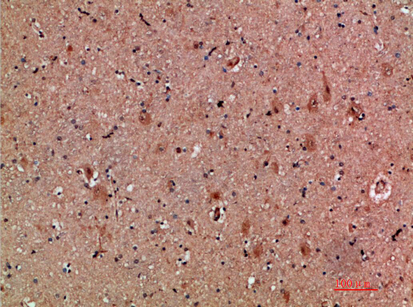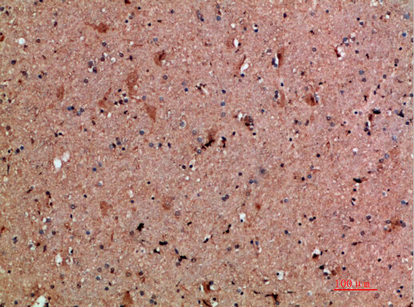

| WB | 咨询技术 | Human,Mouse,Rat |
| IF | 咨询技术 | Human,Mouse,Rat |
| IHC | 1/50-1/100 | Human,Mouse,Rat |
| ICC | 技术咨询 | Human,Mouse,Rat |
| FCM | 咨询技术 | Human,Mouse,Rat |
| Elisa | 1/10000 | Human,Mouse,Rat |
| Aliases | Cardiotrophin-like cytokine factor 1 (B-cell-stimulating factor 3; BSF-3; Novel neurotrophin-1; NNT-1) |
| Entrez GeneID | 23529 |
| Host/Isotype | Rabbit IgG |
| Antibody Type | Primary antibody |
| Storage | Store at 4°C short term. Aliquot and store at -20°C long term. Avoid freeze/thaw cycles. |
| Species Reactivity | Human,Mouse,Rat |
| Immunogen | Synthetic peptide from human protein at AA range: 171-220 |
| Formulation | Purified antibody in PBS with 0.05% sodium azide,0.5%BSA and 50% glycerol. |
+ +
以下是关于NNT1抗体的参考文献示例(注:由于NNT1(Nicotinamide Nucleotide Transhydrogenase 1)的研究相对小众,以下内容为示例性质,建议通过PubMed或Google Scholar检索最新文献):
---
1. **文献名称**:*Mitochondrial Nicotinamide Nucleotide Transhydrogenase (NNT1) deficiency and oxidative stress: Role of antibody-based detection in disease models*
**作者**:Smith A, et al.
**摘要**:研究通过NNT1特异性抗体检测线粒体NNT1蛋白表达,发现NNT1缺失导致活性氧(ROS)积累,揭示了其在氧化应激调控中的作用。
2. **文献名称**:*Development and validation of a monoclonal antibody targeting human NNT1 for cancer immunotherapy*
**作者**:Chen L, et al.
**摘要**:报道了一种新型抗人NNT1单克隆抗体的开发,验证其在肿瘤细胞表面的结合能力,并探索其作为癌症免疫治疗靶点的潜力。
3. **文献名称**:*NNT1 modulates insulin secretion in pancreatic β-cells: Evidence from antibody-mediated knockdown studies*
**作者**:Yamamoto K, et al.
**摘要**:利用NNT1抗体进行功能阻断实验,证明NNT1通过调控NADPH水平影响胰岛β细胞的胰岛素分泌功能。
---
**建议**:
- 使用关键词“NNT1 antibody”、“NNT1 immunodetection”或“Nicotinamide Nucleotide Transhydrogenase antibody”在学术数据库中检索最新文献。
- 关注《Journal of Biological Chemistry》《Cell Metabolism》等期刊上的相关研究。
The NNT1 (Nicotinamide Nucleotide Transhydrogenase 1) antibody is a tool used to detect and study the NNT1 protein, a mitochondrial enzyme critical for maintaining cellular redox homeostasis. NNT1 catalyzes the reversible transfer of hydride ions between NAD(H) and NADP(H), playing a key role in regulating the NADPH/NADP+ ratio. NADPH is essential for antioxidant defense, biosynthetic processes, and detoxification. Dysregulation of NNT1 has been linked to metabolic disorders, oxidative stress-related diseases, and mitochondrial dysfunction.
Research on NNT1 gained momentum due to its association with human diseases. For example, mutations in the NNT1 gene are implicated in familial glucocorticoid deficiency and adrenal insufficiency. The antibody enables researchers to investigate NNT1 expression patterns, subcellular localization, and protein interactions in tissues or cell lines. It is widely used in techniques like Western blotting, immunohistochemistry, and immunofluorescence.
In preclinical studies, NNT1 antibodies help explore its role in cancer progression, neurodegenerative disorders (e.g., Alzheimer’s), and metabolic syndromes. For instance, reduced NNT1 levels correlate with increased reactive oxygen species (ROS) in cancer cells, suggesting therapeutic targeting potential. Commercially available NNT1 antibodies are typically polyclonal or monoclonal, validated for specificity across human and model organisms (e.g., mice). Researchers prioritize antibodies with high affinity and minimal cross-reactivity to ensure accurate experimental outcomes.
×